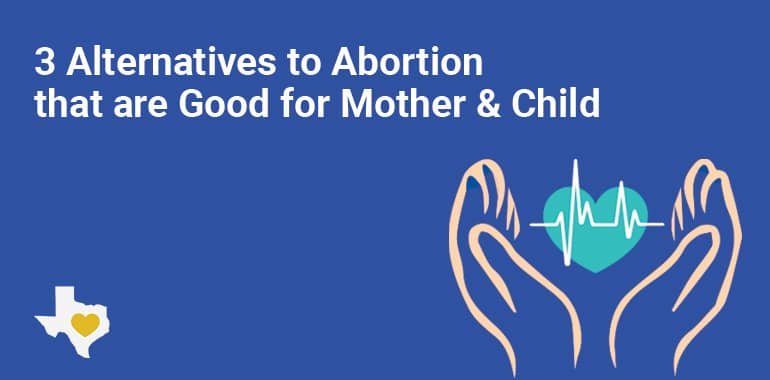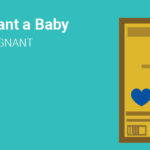
Abortion is not an option for me. What should I do?
An unplanned pregnancy can be terrifying! However, you are not alone in this feeling. Approximately 40% of all pregnancies each year are reported to be unplanned. That’s nearly 1.5 million per year!
So, how are other women dealing with this situation?
A positive pregnancy test may be overwhelming, scary, and unexpected. There are many pregnancy resource centers and crisis pregnancy centers, but they can be confusing to navigate. It’s important to know that there are options other than an abortion procedure.
Many pregnant women are seeking alternatives to abortion that are good for both mother and child. Read more to learn about these alternatives and other things to consider.
3 Unplanned Pregnancy Options Other Than Abortion
There are alternatives to abortion that can be good for the mother and child. Keep in mind that this is not an exhaustive list; however, these are abortion alternatives to consider.
1. Parent the baby yourself
It may go without saying, but choosing to parent (especially choosing to be a single mother) can be difficult, especially if the pregnancy is unintended. For this reason, making an informed decision takes a lot of thought and action planning.
Before committing to parenting, consider your current situation:
- Do you have housing and financial stability (or can you take advantage of social service programs)?
- Can you take time off work or school after birth?
- Will you have a support system to help care for your child?
In addition, they should take the time to determine if they are ready to parent and can take on the responsibility. Ultimately, this is typically a positive resolution for mothers who decide they can parent.
Abortion Alternative More Information: Co-Parenting and Single Fatherhood
Becoming a single mother is a great option for many women, but it may not be the only parenting option. Co-parenting and allowing for single fatherhood are also possible unplanned pregnancy options, in some cases.
On occasion, the father is in a better place to raise the child and/or wants children now. If you’re comfortable, consider having an open conversation with the baby’s father on whether he’s ready to take on this responsibility.
If the baby’s other parent is in the picture, you might consider co-parenting. This means both birth parents share responsibilities, even if they aren’t in a romantic relationship. Co-parenting can work well if:
- Both of you are committed to raising the child.
- You can communicate openly and respectfully.
- You can agree on how to split responsibilities.
With co-parenting, you will need to develop a co-parenting agreement with the father. Are you going to raise this child in a two-parent house or a one-parent house? Do you both want to involve the courts? Where will the child primarily live? Clear and constant communication can help you both have a positive co-parenting partnership and raise a wonderful child as a team.
2. Allow a relative to raise the child
In the event of an unexpected pregnancy, a family member can step forward to raise the child. A relative becomes the child’s legal guardian. Legal guardianship offers a flexible alternative that allows someone else to raise your child without giving up your parental rights. This can be a strong option if you’re unable to raise your child now but plan to in the future, or if you want to stay actively involved in their life.
For mothers who are feeling unsure, entrusting guardianship to a safe and loving relative can be an ideal situation. In this case, the level of responsibility and involvement of the biological mother can be negotiated.
This path offers several benefits:
- Your child grows up surrounded by familiar family values.
- You can remain a consistent presence in their life.
- You may plan for guardianship to be returned to you later on.
As said before, this can be a favorable option for mothers-to-be. However, it takes a great deal of communication and coordination to mediate conflicts with family members. Guardianship arrangements sometimes include child support payments, so it’s important to assess your financial situation with an attorney before making this choice.
Abortion Alternative More Information: Relative Guardianship
After you and your chosen guardian are in agreement, you will need to talk with an attorney. Legal guardianship varies depending on location, the mother’s age, and the guardian’s relation. It’s best to ensure all legalities are settled before the baby’s birth.
The last thing you want is a shuffle to decide where the baby should go moments after delivery. Make sure to discuss the mother’s financial role after the child is born.
3. Place the baby for adoption
Like allowing a relative to parent, creating an adoption plan can be a good alternative for both mother and baby. There are a wealth of families who are eager and ready to provide a stable, loving home to raise a child. In addition, Texas adoption statistics show that adoptees are healthy and thriving in their placement homes.
The adoption process can seem scary and overwhelming. However, with the help of an adoption professional and free pregnancy options counseling, it can be a viable solution. Find an adoption specialist that can walk you through the adoption process, including the types of adoption.
Abortion Alternative More Information: Adoption
Unlike arranged temporary guardianship, adoption is a permanent forever home for your child, and you will not have a say in how the child is raised after the adoption. However, you are guaranteed to be placing your baby with a family who has a strong desire to become an unconditionally loving parent and the financial ability to provide all the opportunities you dream for your child.
Make sure to ask questions about the adoption process and think about what will be the best abortion alternative for you and the child.
Needed Resources for Pregnant Women
No matter which path you choose you deserve access to the care, support, and resources that can help you thrive during and after pregnancy. Fortunately, there are many programs available to assist expectant mothers with medical needs, housing, transportation, financial support, and more.
Here are some of the most helpful resources to consider:
Adoption Agency Support
If you’re considering adoption, working with a licensed adoption agency can provide more than just emotional guidance—it can offer financial assistance, too.
For example, Texas Adoption Center offers comprehensive support for birth mothers, including:
- Medical care and health insurance, including full coverage of prenatal, labor, delivery, and postpartum costs.
- Safe housing if you’re in an unsafe or unstable living environment.
- Transportation assistance, including rides to medical appointments, gas money, or bus passes.
- Financial support for essentials like groceries, utilities, maternity clothes, phone service, and hygiene items.
This type of support ensures you can focus on your well-being without the added stress of covering everyday expenses. Other adoption agencies may offer similar help, so it’s important to research your options and ask questions to ensure the agency meets your needs.
Government Assistance for Pregnant Women
There are several free state and federal programs designed specifically to help pregnant women, especially those experiencing financial hardship. These programs can offer healthcare, housing support, nutrition assistance, and more.
- Medicaid: Offers free or low-cost medical coverage for prenatal care and childbirth.
- CHIP (Children’s Health Insurance Program): Helps pregnant women who earn too much to qualify for Medicaid.
- Temporary Assistance for Needy Families (TANF): Provides financial aid for pregnant women and families with limited income.
Talk To the Experts About Other Options Than Abortion
There are several alternatives to abortion that a mother can choose to consider before terminating a pregnancy.
With this in mind, adoption services are a viable answer for those who want to consider all options. The adoption specialists at Texas Adoption Center are a great place to start if you are curious about adoption.
The team of specialists has combined decades of knowledge and resources to give you the most accurate adoption information. In addition, the organization facilitates a meeting with an independent adoption lawyer where you can further determine whether adoption is the best option for you and your baby.
If you are seriously considering adoption, contact Texas Adoption Center at 512-983-7943 to schedule a confidential meeting with an adoption specialist. We support women, whatever you decide.






